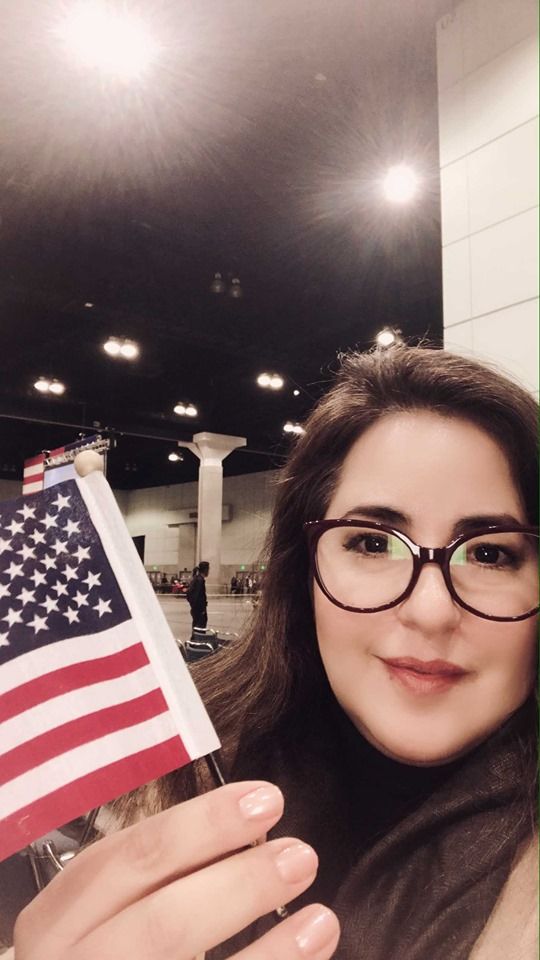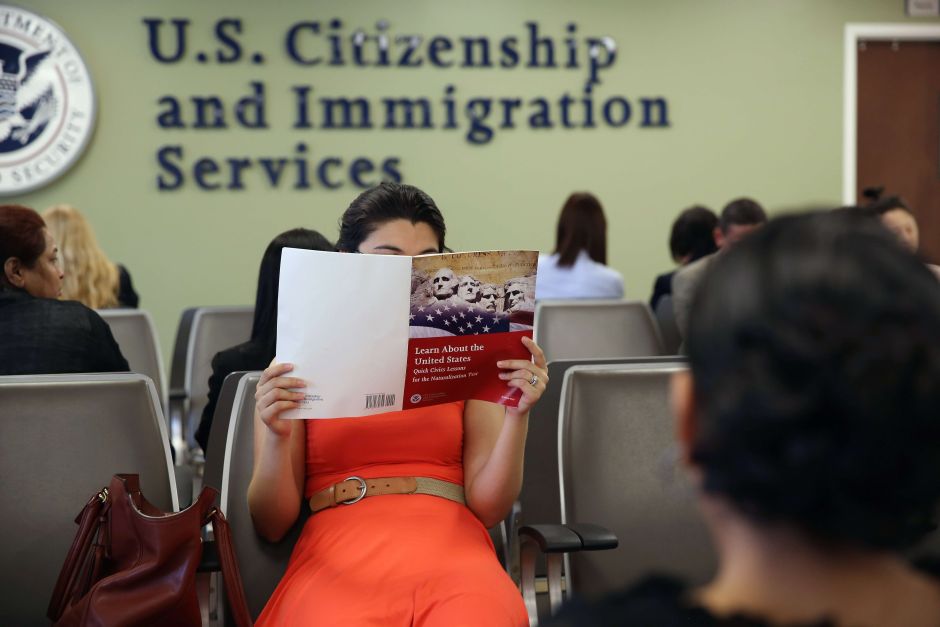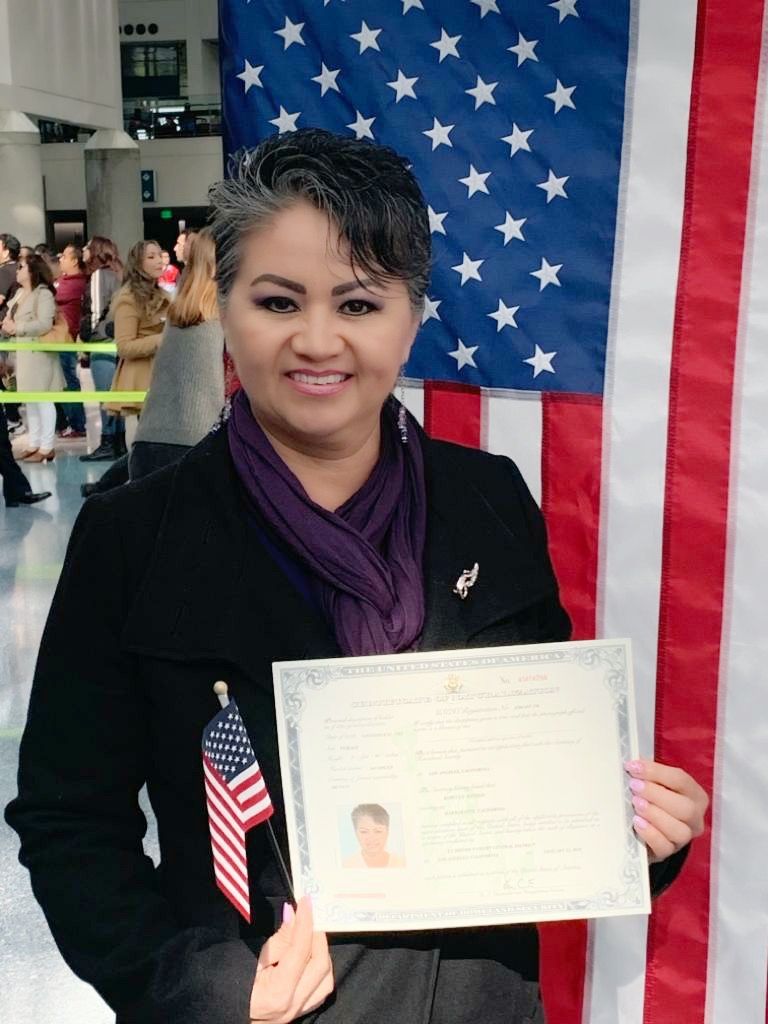Several organizations launch a campaign to motivate the new naturalized to register and can vote at the polls.
A few minutes after becoming an American, Rebeca Sotelo registered as a voter.
“I wanted to become a citizen to have the option to vote, and of course I am excited to participate,” says this Mexican who on January 22 was naturalized at a ceremony at the Los Angeles Convention Center.
A report from the National Alliance for New Americans (NPNA) revealed that there are 5.3 million new naturalized citizens who will have a decisive impact on this year's election especially in states with closed elections that is not the case in California..
This week, several organizations including the Immigrant Rights Coalition (CHIRLA), United States, NPNA, CASA, among others launched a campaign to mobilize new citizens to register and vote.
Rebeca is excited that in her first time as a voter the presidential election will be held in which Trump's re-election will be decided.
"It will be a controversial and commemorative election," says this new citizen of Mexican origin who took the entire process of citizenship 11 months, and began a month before serving five years of residence.
She hopes that she is disappointed that the election for the presidency is not defined by the direct popular vote but through the Electoral College. “A client told me that this was the reason she had never voted since she was a citizen, and that it is no use to vote,” she says.
But despite the comment and although the policy is not passionate, she is ready to exercise her vote and contribute her granite to elect a new president.

Karen Knaiderman plans in the following days to register to vote. Only in November did she become a citizen of the United States when she turned three years old. She is married to a Mexican who is also a citizen by naturalization.
“It is important for me to vote because the US is the country where I live, work and pay taxes. What happens politically affects me, and concerns me. My daughter is born here. It requires some support from the government for its development, and here is my family, my house and my husband, ”says Karen, who made the citizenship process through a lawyer in July 2018.“ It took the process more or less one year".
Verónica González, who lives in Orange County, also became a citizen on January 22 in Los Angeles.
“I did not register for any political party. I don't like that they take it for granted that they already have my vote. I don't want to put on a label, ”he says. And she says that this week her husband has already brought her the electoral brochure to start getting information about what to vote in the March primary elections.

Why Latinos Don't Vote
Veronica had been a resident of the US for eight years.
“It had not occurred to me to become a citizen. But Trump was the catalyst. The day after he won, I said I have to do it, ”he said. “This is the moment, and I began to prepare for citizenship. And I was not the only one. I have friends of all nationalities who started the process. ”
Obtaining US citizenship took Veronica ten months. “It was very fast because I had heard that the waiting time in some states was two years; in California it is 12 to 14 months. ”
The young woman did not want to risk filling out the citizenship application online and preferred to do it on paper. “So you can check it; if you fill it online, you run the risk of making mistakes. ”
Veronica, an artist specializing in glass, says the citizenship test saw it as if it were a job interview.
"You have to be consistent with your answers because they have all your records," he says.
On the day of the citizenship ceremony, she was touched when the judge told the 3,591 people who took an oath that the United States does not ask them to renounce their customs, traditions or leave their language.
"The only thing that asks us, is that we be people of good and have loyalty," she says happy because she just became a citizen before the rule of public charge that denies residence to those who request public benefits came into force.
The now new citizen comments that many people ask her Why Hispanics don't vote
“What happens is that we believe that the vote is useless. Latinos do not have a democratic formation. We think that even if we vote we will have the same kind of politicians. But I have voted in Mexico and here I am also going to do it because it is not worth being dissatisfied and not voting, ”he says.
We can make a difference
Martha Garza is not yet believed to be a citizen of the United States. He naturalized on February 8 in Los Angeles after postponing citizenship for several years.
“After the ceremony I brought the papers to register to vote. I didn't do it out of sheer neglect, but I'm going to do it now One of the reasons to become a citizen is because I wanted to vote. It is important above all because of how we are doing in the country, ”says Martha who took a year to obtain citizenship.
She comments that, although many people say that the vote does not count and that everything is already fixed, she is determined to go to the polls.
“It's a matter of educating ourselves a little, and understanding that we can put a grain of sand by voting and making a difference. Why not try, ”he says.









